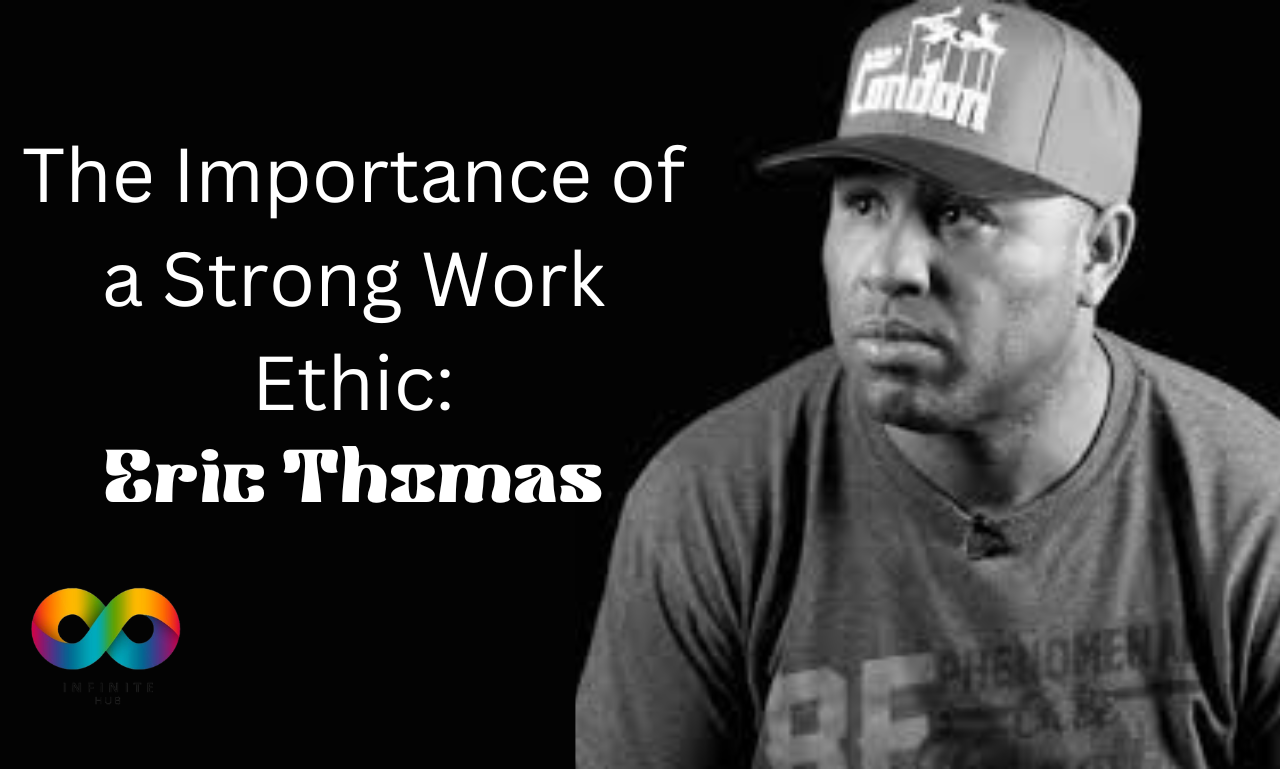Introduction
A strong work ethic is fundamental to achieving success in any field. It is the backbone of perseverance, dedication, and the pursuit of excellence. Renowned motivational speaker Eric Thomas has often emphasized the critical role of a robust work ethic in transforming lives and reaching personal and professional goals. This article delves into the essence of work ethic through the lens of Eric Thomas’s experiences and teachings, exploring how individuals can cultivate and sustain this vital attribute.
Defining Work Ethic
What is Work Ethic? Work ethic refers to the set of values based on the ideals of hard work and diligence. It is the belief that hard work inherently deserves rewards and that through persistent effort, one can achieve success.
Characteristics of a Strong Work Ethic
- Reliability: Consistently meeting or exceeding expectations.
- Diligence: Persistent effort and attention to detail.
- Responsibility: Taking ownership of one’s actions and their outcomes.
- Integrity: Adhering to moral and ethical principles.
- Discipline: The ability to stay focused and resist distractions.
Eric Thomas: A Brief Biography
Early Life and Challenges Eric Thomas’s journey is a testament to the power of resilience and hard work. Born in Chicago and raised in Detroit, Thomas faced significant challenges, including homelessness and academic struggles. These hardships, however, became the bedrock of his inspirational story.
Career Journey Thomas’s determination to overcome adversity led him to pursue education vigorously. He eventually earned a Ph.D. in Education Administration from Michigan State University. His career as a motivational speaker and author began to take off as he shared his story and insights with a broader audience.
Rise to Prominence Eric Thomas, also known as “ET the Hip Hop Preacher,” gained widespread recognition through his powerful speeches and online presence. His viral videos and impactful messages have inspired millions around the globe to adopt a strong work ethic and strive for greatness.
Core Principles of Eric Thomas
Perseverance Eric Thomas often speaks about the importance of perseverance. It is the relentless pursuit of goals despite obstacles and setbacks. Perseverance is what transforms ambition into achievement.
Commitment Thomas emphasizes the need for unwavering commitment to one’s goals. This involves dedicating time, effort, and resources to achieve desired outcomes.
Integrity Maintaining honesty and strong moral principles is central to Thomas’s philosophy. Integrity builds trust and establishes a solid foundation for long-term success.
Passion Passion is the driving force that fuels hard work and dedication. Thomas believes that finding and pursuing one’s passion is crucial for maintaining a strong work ethic.
The Role of Motivation
How Motivation Drives Work Ethic Motivation is the catalyst that transforms intentions into actions. It ignites the drive to start and sustains the effort needed to continue working towards goals.
Eric Thomas’s Motivational Strategies Thomas uses a combination of personal anecdotes, powerful storytelling, and practical advice to motivate his audience. His speeches often include phrases like “When you want to succeed as bad as you want to breathe, then you’ll be successful,” highlighting the intensity of desire needed to achieve success.
Building a Strong Work Ethic
Setting Goals Establishing clear, achievable goals is the first step in building a strong work ethic. Goals provide direction and a benchmark for measuring progress.
Developing Habits Consistent daily habits are crucial for sustaining a strong work ethic. This includes creating routines that promote productivity and efficiency.
Overcoming Procrastination Procrastination can undermine a strong work ethic. Strategies to combat procrastination include breaking tasks into smaller steps, setting deadlines, and maintaining a focus on long-term benefits.
The Impact of Hard Work
Case Studies Examining case studies of successful individuals reveals the critical role of hard work in their achievements. These examples demonstrate that talent alone is not enough; consistent effort is essential.
Real-life Examples Stories of entrepreneurs, athletes, and professionals who have excelled due to their strong work ethic serve as inspiration. Their journeys highlight the importance of persistence and dedication.
Discipline and Consistency
Importance of Discipline Discipline is the ability to maintain focus and control over one’s actions. It is essential for adhering to plans and staying on track towards goals.
Maintaining Consistency Consistency involves maintaining regular and sustained effort. It is the cumulative effect of small, daily actions that leads to significant achievements over time.
Passion and Purpose
Finding Your Passion Identifying what you are passionate about is crucial for developing a strong work ethic. Passion provides the motivation and energy needed to overcome challenges and stay committed.
Aligning Purpose with Work Aligning your work with your purpose ensures that you find fulfillment and meaning in your efforts. This alignment fosters long-term commitment and satisfaction.
Overcoming Adversity
Resilience in the Face of Challenges Resilience is the capacity to recover from difficulties and continue moving forward. It is a vital component of a strong work ethic, as setbacks are inevitable in any endeavor.
Eric Thomas’s Experiences Thomas’s life story is a powerful example of resilience. His ability to overcome homelessness and academic failure to become a renowned motivational speaker illustrates the power of a strong work ethic in overcoming adversity.
Time Management
Effective Time Management Techniques Managing time effectively is crucial for maintaining a strong work ethic. Techniques include prioritizing tasks, using time-blocking methods, and avoiding distractions.
Prioritization and Planning Prioritizing tasks based on their importance and urgency helps ensure that critical activities receive the necessary attention. Planning ahead allows for efficient use of time and resources.
Mindset and Attitude
Positive vs. Negative Mindset A positive mindset fosters a proactive approach to challenges and opportunities, while a negative mindset can hinder progress and motivation.
Growth Mindset Adopting a growth mindset, which involves believing in the ability to develop and improve through effort, is essential for a strong work ethic. This mindset encourages learning and persistence.
Self-Motivation Techniques
Practical Tips for Self-Motivation Self-motivation techniques include setting personal rewards, visualizing success, and maintaining a positive environment. These strategies help sustain effort and enthusiasm.
Staying Motivated Over Time Long-term motivation requires periodic reassessment of goals, celebrating small victories, and staying connected with one’s purpose and passion.
The Power of Persistence
Examples from Eric Thomas Thomas’s journey exemplifies the power of persistence. His consistent effort in the face of adversity highlights the importance of never giving up.
Benefits of Persistence Persistence leads to mastery and achievement. It allows individuals to overcome obstacles, learn from failures, and ultimately achieve their goals.
Accountability and Responsibility
Taking Ownership of Actions Accountability involves taking responsibility for one’s actions and their outcomes. It is essential for personal and professional growth.
The Role of Accountability Partners Having accountability partners can provide support and motivation. They help ensure that commitments are met and goals are pursued diligently.
Continuous Learning
Importance of Learning and Development Continuous learning is crucial for staying relevant and improving skills. It is a key aspect of a strong work ethic, fostering innovation and growth.
Eric Thomas’s Approach to Personal Growth Thomas emphasizes the importance of lifelong learning and personal development. His commitment to education and self-improvement is a cornerstone of his philosophy.
Work-Life Balance
Balancing Professional and Personal Life Achieving a balance between work and personal life is essential for overall well-being. It helps prevent burnout and ensures sustained productivity.
Strategies for Achieving Balance Effective strategies include setting boundaries, prioritizing self-care, and ensuring time for relaxation and family.
Setting and Achieving Goals
SMART Goals SMART (Specific, Measurable, Achievable, Relevant, Time-bound) goals provide a clear and structured approach to goal setting, enhancing the likelihood of success.
Long-term vs. Short-term Goals Balancing long-term and short-term goals ensures continuous progress and allows for flexibility in achieving larger objectives.
The Role of Mentorship
Finding a Mentor A mentor provides guidance, support, and wisdom. Finding the right mentor can accelerate personal and professional growth.
Eric Thomas’s Mentors and Their Impact Thomas has had several mentors who have influenced his journey. Their guidance has been instrumental in his development and success.
Networking and Relationships
Building Professional Relationships Strong professional relationships are essential for career growth. Networking provides opportunities for collaboration, support, and mentorship.
The Importance of a Support Network A support network offers emotional and practical support, helping individuals stay motivated and resilient.
Inspiring Others
How to Inspire and Motivate Others Inspiring others involves leading by example, offering encouragement, and sharing experiences. Thomas’s motivational speeches are a prime example of how to inspire large audiences.
Eric Thomas’s Influence Thomas has inspired millions with his messages of perseverance and hard work. His impact extends beyond motivational speaking to personal and professional development.
Health and Well-being
Physical Health’s Impact on Work Ethic Good physical health supports sustained effort and productivity. Regular exercise, proper nutrition, and adequate rest are crucial.
Mental and Emotional Well-being Mental and emotional well-being are equally important. Stress management, mindfulness, and emotional resilience contribute to a strong work ethic.
The Journey to Success
Defining Success Success is subjective and varies for each individual. It involves setting and achieving personal goals, finding fulfillment, and making a positive impact.
Eric Thomas’s Journey to Success Thomas’s journey from adversity to success exemplifies the transformative power of a strong work ethic. His story is an inspiration for those striving to achieve their dreams.
Legacy and Impact
Creating a Lasting Legacy Building a lasting legacy involves making significant contributions that positively impact others. It is the culmination of a lifetime of hard work and dedication.
Eric Thomas’s Contributions to Society Thomas has contributed to society through his motivational speaking, mentorship programs, and educational initiatives. His work has inspired and empowered countless individuals.
Real-life Applications
Applying Eric Thomas’s Principles in Everyday Life Applying the principles espoused by Eric Thomas involves adopting a strong work ethic, setting goals, and remaining committed to personal growth.
Practical Examples Practical examples include daily routines, goal-setting strategies, and resilience practices that align with Thomas’s teachings.
The Future of Work Ethic
Trends in Work Ethic The future of work ethic involves adapting to technological advancements, remote work, and the evolving nature of jobs.
Future Challenges and Opportunities Future challenges include maintaining work ethic in a rapidly changing world, while opportunities lie in leveraging technology for greater productivity and work-life balance.
Common Misconceptions
Debunking Myths about Work Ethic Common myths include the idea that work ethic is innate rather than developed, and that hard work alone guarantees success.
Truths vs. Misconceptions The truth is that work ethic can be cultivated through discipline, learning, and perseverance. Success also requires strategy, adaptability, and resilience.
Work Ethic in Different Cultures
Cultural Perspectives on Work Ethic Different cultures have varying perspectives on work ethic. Understanding these differences can enhance cross-cultural collaboration and respect.
Global Examples Examples from around the world illustrate diverse approaches to work ethic, highlighting universal principles and unique practices.
FAQs
What are the key components of a strong work ethic?
A strong work ethic includes reliability, diligence, responsibility, integrity, and discipline. These components ensure consistent and effective effort towards achieving goals.
How can I develop a strong work ethic?
Developing a strong work ethic involves setting clear goals, establishing productive habits, staying disciplined, and maintaining a positive mindset. Continuous learning and seeking mentorship can also help.
What role does motivation play in work ethic?
Motivation is crucial as it drives the desire to work hard and persist in the face of challenges. It provides the energy and focus needed to achieve goals.
Can work ethic be taught?
Yes, work ethic can be taught through education, mentorship, and personal development. It involves learning values, habits, and attitudes that support hard work and perseverance.
How does work-life balance affect work ethic?
A good work-life balance ensures overall well-being, preventing burnout and promoting sustained productivity. It allows individuals to maintain a strong work ethic over the long term.
What impact has Eric Thomas had on the concept of work ethic?
Eric Thomas has significantly influenced the concept of work ethic through his motivational speaking and personal example. His teachings emphasize perseverance, commitment, and passion as key elements of a strong work ethic.
Conclusion
In conclusion, a strong work ethic is essential for achieving success and fulfillment in life. Eric Thomas’s experiences and teachings provide valuable insights into cultivating and sustaining this critical attribute. By embracing principles of perseverance, integrity, and passion, individuals can overcome challenges and achieve their goals. The journey to success requires continuous effort, learning, and a positive mindset, all of which are fostered by a robust work ethic.
============================================



